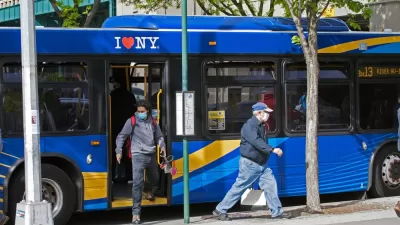American transit systems are increasingly moving to structures that allow pre-paying and all-door boarding. David Meyer argues that these systems have proven their worth and fears of fare evasion aren't enough to justify inferior services.

In New York, transit officials are prioritizing collecting every fare over providing faster more efficient transportation, argues David Meyer in a piece for Streetsblog NYC. "Speaking at TransitCenter last night, transportation officials from Boston, San Francisco, London, and Oslo shared how their agencies put the rider experience at the center of fare modernization efforts. They see the possibilities to provide fast, convenient service, and they are seizing them," Meyer reports.
The issue in question is all-door boarding for buses. All-door boarding means that rather than having each passenger slide a fare card into a machine in front of the driver as they board, bus riders could pay before boarding or at stations on the buses at both doors. Then, periodically, fare agents would check whether or not riders had paid using electronic proof-of-payment systems. Advocates of this system, like Meyer, argue that this payment process could potentially save minutes at every crowded bus stops and shave commute times for bus riders during the most busy times. Those who oppose all door boarding argue that the system creates an opportunity for riders to avoid paying.
Meyers finds this argument unconvincing, "New Yorkers could have faster transit, less police harassment, and a more convenient fare system too, if the MTA follows the lead of these agencies and gets out of its own way."
FULL STORY: How Cities Stopped Panicking About Fare Evasion and Made Transit Faster

Maui's Vacation Rental Debate Turns Ugly
Verbal attacks, misinformation campaigns and fistfights plague a high-stakes debate to convert thousands of vacation rentals into long-term housing.

Planetizen Federal Action Tracker
A weekly monitor of how Trump’s orders and actions are impacting planners and planning in America.

San Francisco Suspends Traffic Calming Amidst Record Deaths
Citing “a challenging fiscal landscape,” the city will cease the program on the heels of 42 traffic deaths, including 24 pedestrians.

Defunct Pittsburgh Power Plant to Become Residential Tower
A decommissioned steam heat plant will be redeveloped into almost 100 affordable housing units.

Trump Prompts Restructuring of Transportation Research Board in “Unprecedented Overreach”
The TRB has eliminated more than half of its committees including those focused on climate, equity, and cities.

Amtrak Rolls Out New Orleans to Alabama “Mardi Gras” Train
The new service will operate morning and evening departures between Mobile and New Orleans.
Urban Design for Planners 1: Software Tools
This six-course series explores essential urban design concepts using open source software and equips planners with the tools they need to participate fully in the urban design process.
Planning for Universal Design
Learn the tools for implementing Universal Design in planning regulations.
Heyer Gruel & Associates PA
JM Goldson LLC
Custer County Colorado
City of Camden Redevelopment Agency
City of Astoria
Transportation Research & Education Center (TREC) at Portland State University
Jefferson Parish Government
Camden Redevelopment Agency
City of Claremont





























